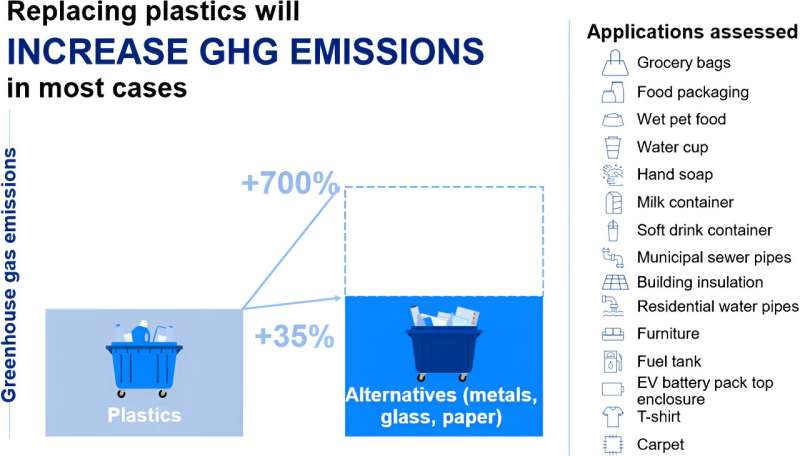This article has been reviewed according to Science X's editorial process and policies. Editors have highlighted the following attributes while ensuring the content's credibility:
fact-checked
peer-reviewed publication
trusted source
proofread
Replacing plastics with alternatives is worse for greenhouse gas emissions in most cases, study finds

Substituting plastics with alternative materials is likely to result in increased GHG emissions, according to research from the University of Sheffield.
The study by Dr. Fanran Meng from Sheffield's Department of Chemical and Biological Engineering, in collaboration with researchers from the University of Cambridge and the KTH Royal Institute of Technology, has revealed the emissions associated with plastic products compared to their alternatives.
Published in the journal Environmental Science & Technology, the study looked at plastics and their replacements across various applications, including packaging, construction, automotive, textiles and consumer durables. These sectors collectively represent a significant portion of global plastic usage.
Findings from the study have revealed that in 15 out of the 16 applications examined, plastic products actually result in lower GHG emissions compared to their alternatives. The reduction in emissions spans from 10 percent to as high as 90 percent across the product life cycle.
To understand the environmental impacts, the Sheffield academics used a tool called life cycle assessment (LCA). This method helps compare how different products affect the environment. The study adopted an LCA approach to evaluate the GHG emissions associated with plastic products versus alternatives across different sectors.
Even when focusing solely on direct life-cycle emissions, plastics maintain their advantage in nine out of 14 applications. Factors such as lower energy intensity during production and the weight efficiency of plastics contribute to their reduced environmental footprint compared to alternatives like glass or metal.
Plastics also demonstrate superiority in upstream processes, including production and transport, in 10 out of 16 applications. This advantage stems from their lower energy intensity and lighter weight, highlighting the efficiency of plastic materials in mitigating emissions, according to the study.
Dr. Fanran Meng, Assistant Professor in Sustainable Chemical Engineering at the University of Sheffield, said, "Not all alternative or recycled products are better for the environment than the products they replace. Environmental policymaking needs life cycle assessment guided decision-making to make sure that GHG emissions are not unintentionally increased through a shift to more emission-intensive alternative materials."
"Demand reduction, efficiency optimization, lifetime extension, and reuse/recycling are win-win strategies to reduce emissions effectively. Solely focusing on switching to alternative materials is not."
The study has also revealed the complexity of indirect impacts from background systems surrounding plastics, which play a substantial role in certain applications. For instance, in scenarios like insulation and hybrid vehicle fuel tanks, the indirect impacts overshadow the direct emissions of plastics, presenting a nuanced perspective on their environmental performance.
Furthermore, plastic packaging plays a crucial role in preserving the quality of food across a wide range of categories, helping to prevent food spoilage and the GHG emissions it causes. This essential function highlights the unmeasured environmental benefits of plastic packaging when compared to alternative materials.
Findings from the research suggest that optimizing plastic use, extending product lifetimes, boosting recycling rates, and enhancing waste collection systems may offer more effective strategies for reducing emissions associated with plastic products.
Dr. Meng added, "Our research highlights the importance of using the life cycle assessment tool to understand better how plastics and their alternatives can affect the environment, but I would also like to stress the importance of not overlooking the impact of plastics on marine ecosystems and potential impacts on human and ecological health."
"We need to consider all of these impacts when choosing which materials to use in products to ensure we are using the right materials for the right purpose and to help us develop a sustainable plastics sector."
The research team notes that future modeling could be expanded to include reusable bioplastics and compostable and biodegradable alternatives. They were excluded from this study due to small market values and a lack of reliable data about reuse.
More information: Fanran Meng et al, Replacing Plastics with Alternatives Is Worse for Greenhouse Gas Emissions in Most Cases, Environmental Science & Technology (2024). DOI: 10.1021/acs.est.3c05191
Journal information: Environmental Science & Technology
Provided by University of Sheffield




















